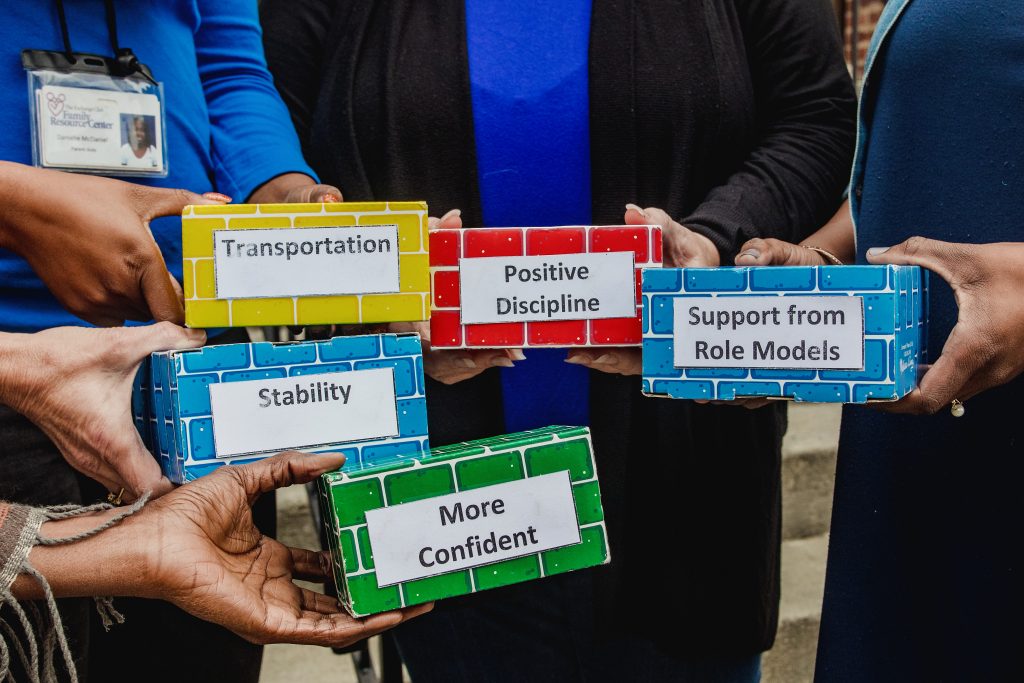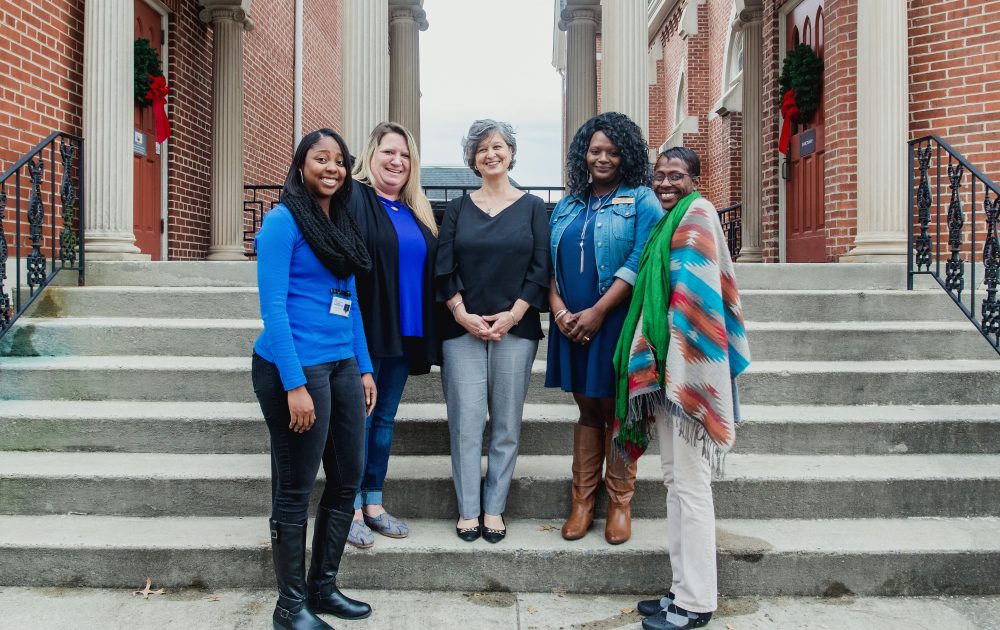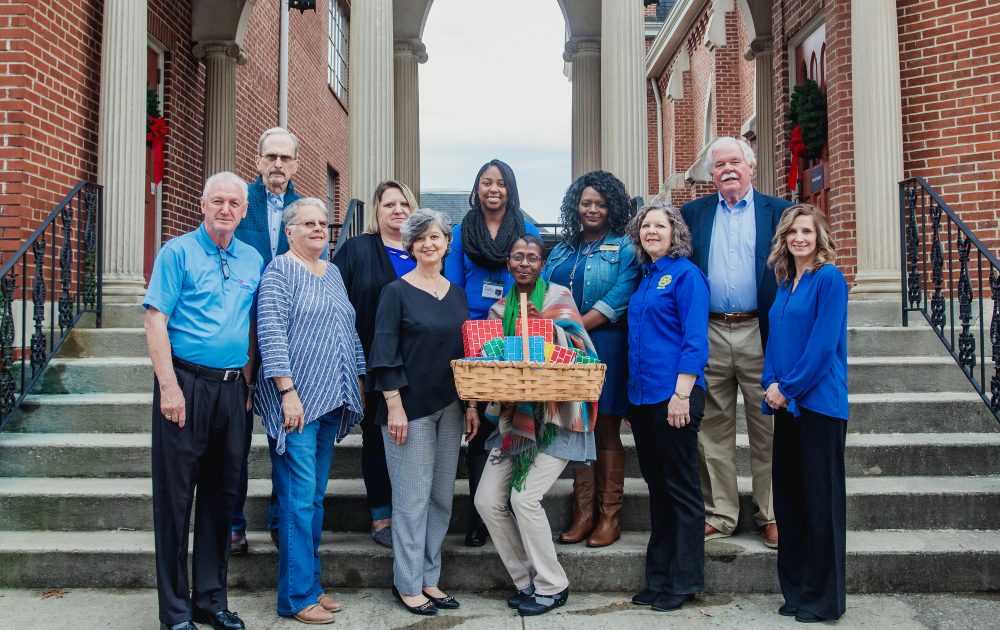
In the Spring of 1979, The National Exchange Club adopted the prevention of child abuse as a national project.
Beginning in the late 80’s, the Exchange Club of Rome became interested in opening a center after learning of other parent-aid programs, as none existed in Rome or Floyd County.
After three years of work, the Exchange Club Family Resource Center officially opened in November of 1991 with the mission of preventing child abuse and neglect. The Floyd County Center (FRC) is a part of a national network of centers that use the model of Exchange Parent Aid. There are 67 such centers across the United States; however, the Family Resource Center is the only program of its kind in Georgia. The FRC has grown from one employee in 1991 to eight employees now, and from serving five families a year to now serving 131 yearly.
Services provided by the Family Resource Center are family-centered and focus on child safety, problem-solving skills, parenting skills and social support. Through these services, the FRC’s goals are to facilitate safety (children are protected from abuse and neglect), permanency (children have permanency and stability in their living situations), and child and family well-being (families recognize the needs of their children, have enhanced capacity to provide for those needs and have support systems).
Tina Bartleson, Executive Director for the Family Resource Center, is in her second tenure with the center. She was with the FRC from 1994-2001. She resigned in 2001 to spend time with her newborn baby boy for a few years. She worked part time with the National Model of the Exchange Club and then returned to the local FRC in 2013.
Bartelson’s background is with the Department of Family and Children Services as an investigator. She was driven to join the Family Resource Center due to patterns that she noticed. “I felt like I kept seeing the same families coming to me again and again” she says.“What I found is that parents love their children. It is hardly ever a matter of lack of love. It is a matter of having the information and support they need to be successful. When I learned about this model is that I very much wanted to be involved, and they were crazy enough to hire me, and then promote me as the director,” Bartelson says with a laugh.
The FRC and the Parent Aide program is about child abuse prevention and helping families who may feel overwhelmed. They also assist parents with children who have behavior problems and assist parents who may not have an understanding where their children are developmentally.
Other services provided include helping with the relief of financial pressure and helping families with no support system.
Families do have to be referred by sources like the Department of Family and Children’s Services, schools, other agencies and sometimes from neighbors or community members. The family has to be willing to have someone meet with them in their home and to try to work through a provided plan. The services are free and completely dependent on the consent of the family in need, though some families have been strongly recommended to utilize the FRC via the courts and/or DFACS involvement.
A family’s criteria for assistance is to be experiencing some form of challenge that is negatively impacting the them as a unit. They also must be a resident of Floyd County and must have one child in the home under 12 years old.
FRC is not a counseling program,; they are a skill building program. “We focus a lot on those practical things parents need to be successful,” Bartleson says. “We aid in helping them through day-to-day processes, like how a parent gets their child on a schedule so that they are able to make it to work and get their kids to school on time. We also help parents to learn how to manage behavior in a way that is positive, and in ways that get the job done but isn’t abusive. We try to change the culture of with screaming at them or any other abusive behavior that could harm the child down the road.”
Bartleson enjoys her job and can easily explain why. “I feel fulfilled,” she smiles. “I love families and as a parent myself I know that we can’t always do it alone; it is a really hard job. There are a lot of different parts to being a parent. You always have the practical stuff like laundry, food, taking care of the house and going to work. When you add all of the things that complicate life, like a parent who was abused themselves, then it carries over into their adulthood.
“We also have parents that don’t have a support system,” she continues. “Sometimes, it just gets overwhelming. What we do is we take all of what a parent may be juggling and help put it into a basket per se, so that makes it more organized and manageable.
“Once we meet a family, we try to learn what their story is. We want to know how they got to their current way of living, what is happening for them that is feeling overwhelming, what scheduling difficulties they may have and how to get it all into a basket to be managed. We also get an idea of where they want to go as a unit and what their family’s goals are. For some, that’s getting a handle of their financial situation. For others it is a struggle with the child or children,” Bartleson explains.“We really help them pinpoint what they want to work on then we bring in curriculum information and meet with them weekly to work on the curriculum. This is our process for starting to work with them and to address the issues they have. We also sometimes see things that they don’t see, and we add those things to their plan.”
A family that is currently working with the Family Resource center had nothing but kind words for the group. The father (we will call him Joe for privacy reasons) breaks down what he sees from the Family Resource Center.

“For us, the Family Resource Center has been a help to establish our family or get re-established as a family. They’ve helped keep our family together. There are a lot of things that go on in life. To be honest, in some situations, having an outside source like the FRC can be a blessing,” Joe says.
“Any time we were in need, all we have had to do is call our parent aide and they’ve been able to assist us,” Joe adds. “Due to our situation, having them come into our home and into our lives, they’ve helped us with the continuation of our structure. They’ve helped us decipher what’s going on and what our issues are. They’ve helped us to be able to dissect, detect, and be able to deal with our household issues. Without the FRC, life would be a struggle, a major struggle. It would be hard for us as parents and our children. They’ve been able to help us keep everything in the circle.”
He then remarks about their parent aide. “Our parent aide is very accessible, like the lawyer commercial, one call that’s all. She is excellent.”
Bartleson explains another factor that makes the FRC successful. “What makes the program work are relationships,” she says “and the fact that we can be intentional and intensive with the families. They’re not coming to us, we’re going to them to see what makes them tick. We then partner with them to get everything on a good path.”
Joe also gives advice to anyone else who may need the FRC. “There’s no reason to be bashful about asking for help. There’s no reason anyone should be afraid to ask for help, because the help you chose not to ask for or take advantage of could be what causes a downfall in your life. It could be the difference between overcoming and adapting, or becoming another statistic and being in the system. They are caring. They go above and beyond. There’s no other organization like the FRC. As a staff, they are nothing but a blessing. They become part of your family and they become part of the healing in your life. They helped us see and do what is best for us, especially our children.”
One parent aid (we will call her Helen), described the center as the best job she could ever have. Helen loves the center, she loves what she can do for people, and she loves that she can go out into the homes and meet families where they are. “We can help you find all of the resources you may need,” Helen says.“We can talk to the school system on a family’s behalf, we can get them help with counseling, we can help with resources for food, parenting classes and just about anything else they may need. We will go and find it.” Helen says proudly.
“We are very much partners with our families,” Bartleson says. “Once we see that they are achieving the goals or progressing, we’ll know the time is nearing to close. We have testing that we use as well, so we’re looking for an improvement in those test scores as well as working on their plans. Typically, families work with us for about eight months and about 85 percent of families graduate from the program. That means they have worked with the FDR for multiple months and have accomplished at least two of the goals in the area of safety, life skills, etc. And families are always free to come back if they find that they need the extra support.”
“One of my favorite stories was when I was with DFACS,” recalls Bartleson, “ is when I dealt with a lady from a bad situation when she was a child, but we could never confirm it. When she became an adult, and had her own children, she called me up and told me that she didn’t want to repeat how she had grown up and needed some help. We worked with her for nearly a year. After completion, we closed her case successfully and she graduated from the program. Years later she had another child and asked for help to make sure she stayed on the right path. As time passed, all of her children graduated college and were working. She herself had gone back to school and was working with a social service agency. We saw her break the cycle. She was determined to be there for her grandchild.”
The Family Resource Center needs community support. Donations are a key way help. You can donate in many ways. Stop by their office at 202 East Third Avenue to see how you can contribute. They also have four events annually; a Night at the Movies (Feb.), a Golf Tournament (May), a Road Race and Health Walk (Aug.), and a Bowling Tournament (Nov).
For more information about these events or the make a referral, please call the Exchange Club Family Resource Center at 706-290-0764.




